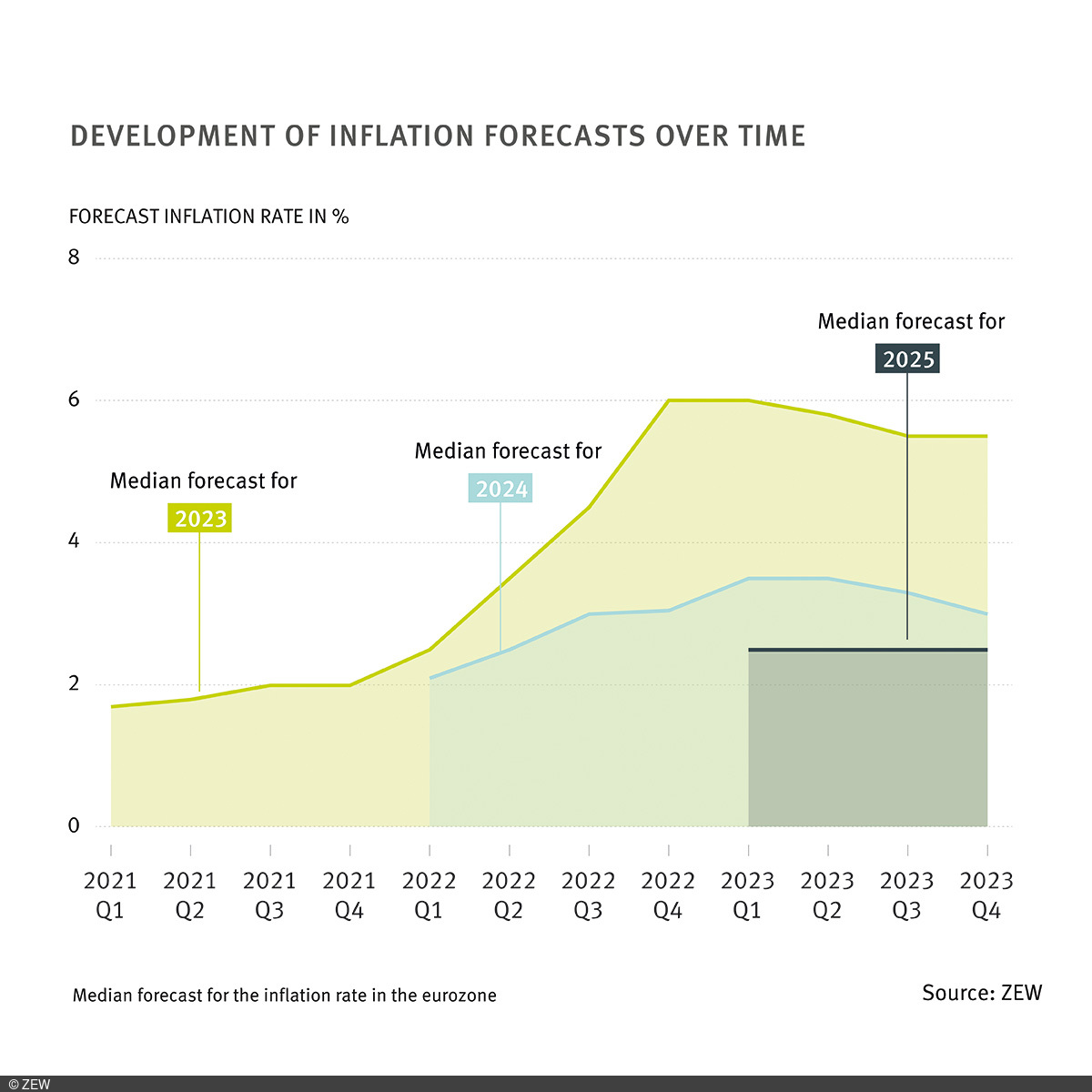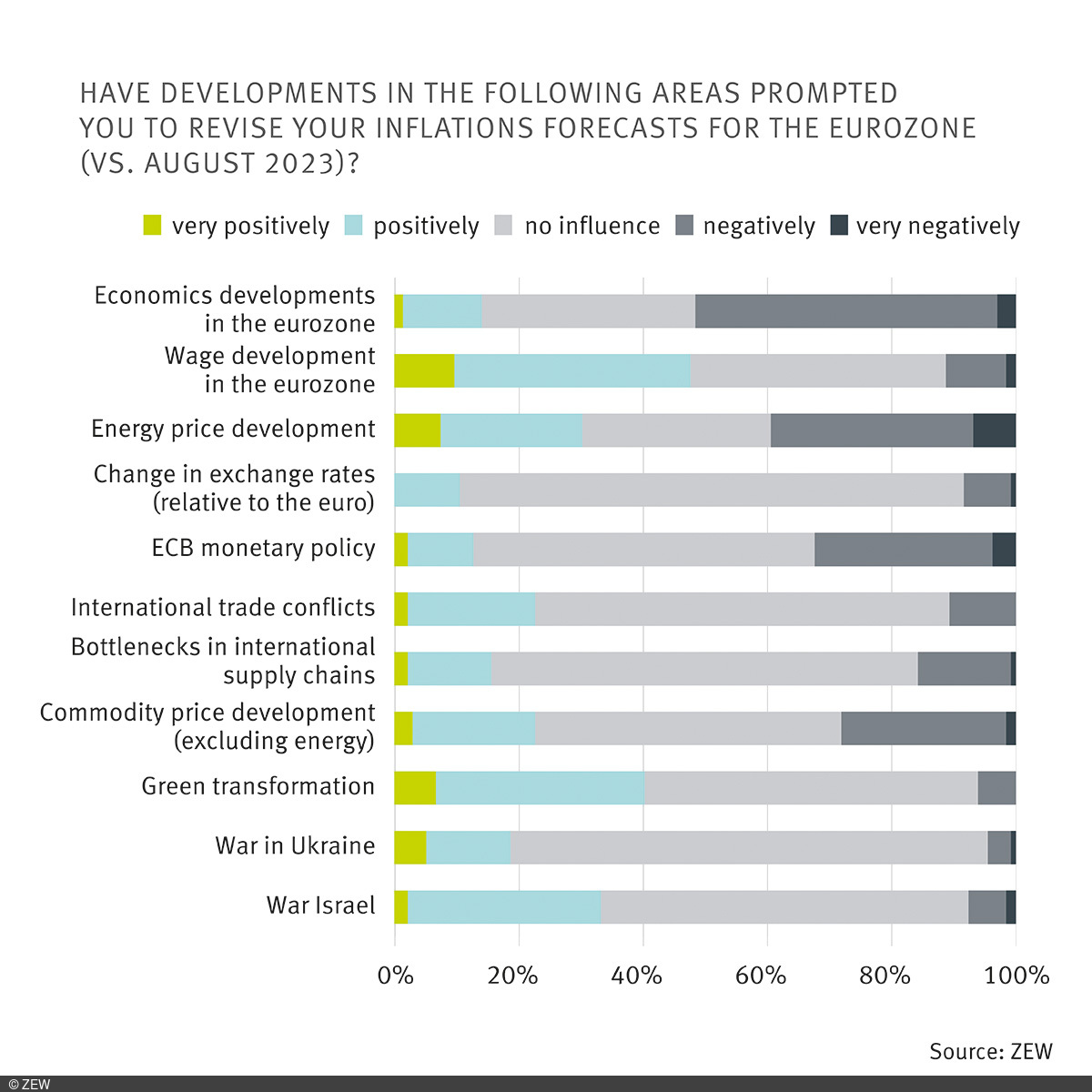Inflation Expectations Stabilise
ResearchSpecial Question in the ZEW Financial Market Survey from November 2023
After a notable dip in August 2023, the inflation expectations among financial experts surveyed by ZEW Mannheim have remained stable for the years 2023, 2024, and 2025 as of November 2023. Likewise, the respondents’ interest rate projections remain largely unchanged compared to August 2023. While the economic developments in the eurozone continue to have a dampening effect on the inflation expectations of ZEW survey participants, wage development is proving to be an inflation driver. Moreover, about a third of experts have revised their inflation expectations upward due to the war that broke out in Israel and Gaza in October 2023. These are the results of the special question included in the ZEW Financial Market Survey in November 2023, in which the respondents provided their predictions of how inflation and key interest rates will develop in the eurozone from 2023 to 2025.
“Inflation expectations dropped in the August 2023 survey but have since remained stable. While experts still anticipate a gradual decline in the inflation rate in the coming years, it is projected to linger half a percentage point above the ECB’s two per cent target in 2025. The inflation forecast trends in 2023 signal the onset of a shift in inflation expectations,” comments Dr. Lora Pavlova, a researcher in ZEW’s “Pensions and Sustainable Financial Markets” Unit. Her colleague at ZEW, Dr. Frank Brückbauer, adds, “A mix of inflationary and deflationary developments over the past three months has kept overall inflation expectations stable.”
Several factors contribute to stability in expectations
In the November 2023 survey, financial market experts anticipate median inflation rates of 5.5, 3.0, and 2.5 per cent for 2023, 2024, and 2025, respectively. The majority thus maintains the belief that the ECB will fall short of its two per cent inflation target from 2023 to 2025.
52 per cent of the financial experts consider the economic development in the euro area to have a deflationary effect, while 40 per cent think that the fall in energy prices is also helping to dampen the inflation rate. Around a third of respondents cite the ECB’s monetary policy as a reason for revising their inflation forecasts downward.
According to 48 per cent of the respondents, wage developments continue to be the leading factor contributing to inflation, closely followed by the green transformation of the economy with 40 per cent. While the war in Ukraine no longer has a significant impact on the majority of experts’ inflation forecasts, the war that broke out in Israel and Gaza in October 2023 plays a greater role. About a third of respondents say they have increased their inflation forecasts compared to August 2023 due to the conflict. Therefore, the conflict in the Middle East mainly affects inflation in the euro area through energy prices and the escalation of international trade conflicts.
About the survey
The ZEW Financial Market Survey has been conducted since December 1991. Participants are asked monthly about their expectations concerning the development of major international economies, including Germany, the eurozone, the United States and China. In total, the panel consists of about 350 financial analysts from banks, insurance companies and selected corporations, specifically from the finance, research and economics departments as well as the investment and securities departments. Most of the participants are from Germany.
The financial experts are asked about their expectations on a six-month horizon regarding the development of the economy, the inflation rate, short- and long-term interest rates, equity prices and exchange rates. In addition, they are asked to assess the earnings situation in 13 German sectors. Besides a fixed survey section, special questions on current topics are included on a regular basis. The ZEW Indicator of Economic Sentiment, which has established itself as an early indicator of economic development (“ZEW Index”), is calculated from the expectations of financial market experts on the development of the economic situation in Germany. The results are published and analysed in detail in the monthly ZEW Financial Market Report.



